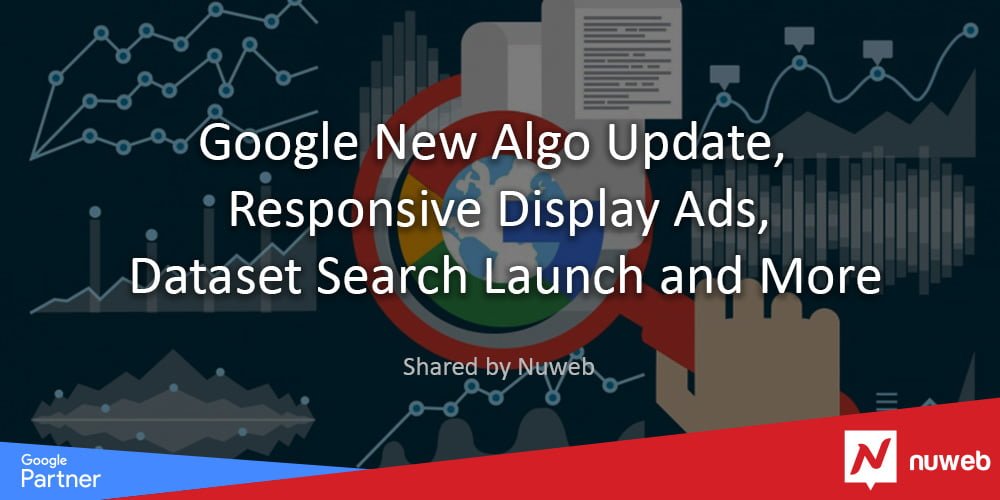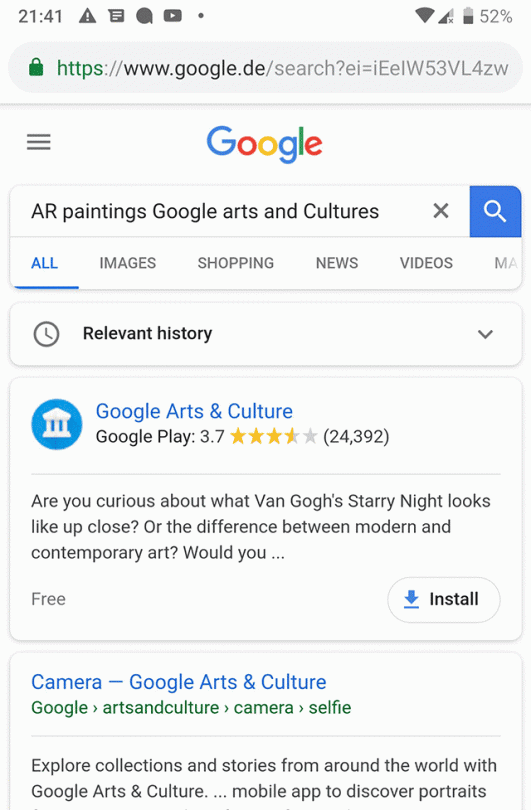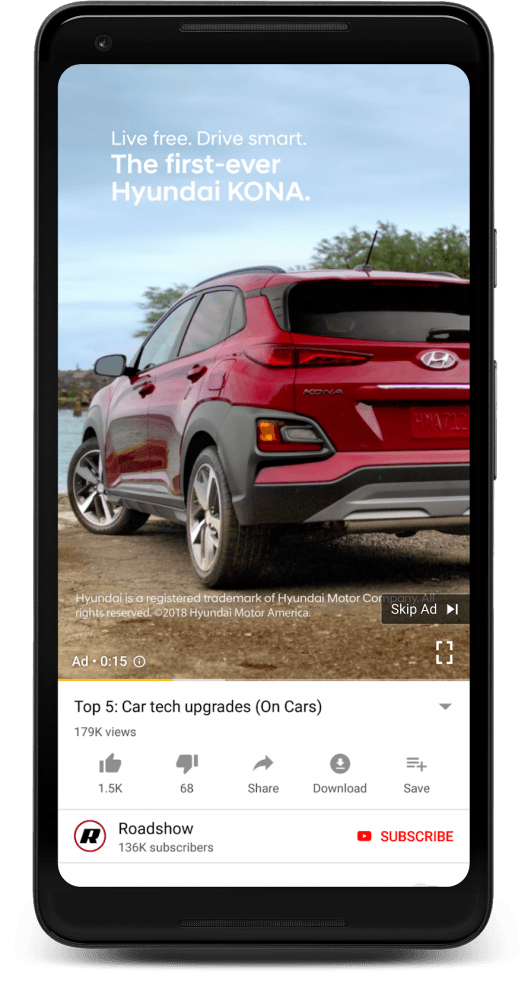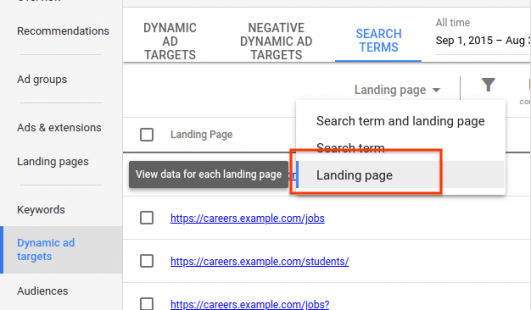
08 Oct Google New Algo Update, Responsive Display Ads, Dataset Search Launch and More
In the last two weeks, we have been busy looking through a series of amazing updates from Google, including the launch of Dataset Search which is one of a chain of initiatives taken by the search engine giant to bring datasets more prominently into their products.
As you move through the digest, you will notice a number of other, not-so-routine updates coming soon that could have great significance for advertisers, as well as the regular users of Google. Let’s jump right in, but for more in-depth discussion tune in to our Search Marketing Scoop podcast, where Jennifer Slegg and Christi Olson are discussing all the latest headlines.
GOOGLE SEARCH NEWS
Google Algorithm Update On September 11th
There is an increasing amount of chatter among the online community about a possible algorithm update from Google last week. Most of the tools used to monitor Google updates, site rankings, and SEO trends are also reported to have shown significant fluctuation in rankings. Although the reaction from the web community is not very strong at the moment, there is a high possibility of Google testing a new algorithm update.
Source: Google Algorithm Update On September 11th
Testing New Video Search Results Box
Google appears to be testing a new user interface for video content in mobile search results. Instead of the usual video carousel, there is an expanded video box at the top with two more videos shown right below it and the option (a drop-down arrow) to expand the section to see a range of other videos. A Twitter user from Munich, named Valentin Pletzer, seems to have first noticed it and posted about it: “Google is testing a new mobile video onebox. Changing the carousel into an expandable onebox.”
Source: Google Tests New Video Search Results Box
Testing «Relevant History» Section On Mobile SERPs
Google appears to be testing a new feature for search users called Relevant History. When you search for something that matches with your previous searches on Google, a new section appears that seems to show your past searches which are relevant to the search/keywords you triggered right now. However, we are not sure if this is a feature Google may consider implementing soon.

Source: Google Tests “Relevant History” In Search Results
GOOGLE ADS NEWS
Changes in [Exact Match] in Google Ads
In an announcement made on September 6, Google explained a new feature that matches the intent of searchers with close variants of the exact keywords. Google’s “exact match close variants” feature will soon begin including close variations that share the same meaning as the advertisers’ keywords. According to Google, “This means your exact match keywords can show ads on searches that include implied words, paraphrases and other terms with the same meaning.”
Source: Match the intent of a search with close variants
Responsive Display Ads in Google Ads
Google has recently announced the launch of responsive display ads (RDA) for online advertisers. What it essentially does is help advertisers deliver the most relevant, engaging, and valuable ads across the web at scale. Creating customized ads that respond well across millions of sites and apps on the web is not practical or even possible for advertisers; RDA combines the power of machine learning with human creativity to deliver better performance.
Advertisers don’t have to do much in the process; they just need to provide a few simple inputs about their businesses and products, like images, headlines, descriptions, and logos (in multiple sizes and formats), and Google uses their machine learning power to test different combinations and show the ads that work best. Advertisers can then use the asset report to see how each asset (e.g., headline, image, logo, etc.) is performing. The performance column of the asset report shows a “Learning,” “Low,” “Good,” or “Best” rating based on how well an asset performs.
Source: Deliver the best message across the web with responsive display ads
New Ad Types On Youtube
Google confirms rolling out their vertical video ads update for TrueView and Universal App campaigns on YouTube. According to the search engine, vertical video ads provide a bigger, more beautiful canvas to deliver advertisers messages on mobile and allow customers to engage with the content as it serves their viewing preferences. YouTube’s chief product officer, Neal Mohan, said in a conversation with The Drum: “It’s actually something we had been hearing from advertisers and their creative agencies for some time, and now we’re happy to deliver it, and my expectation is that what they do with it will exceed our expectations from a creativity standpoint.”

Sources: Vertical video ads now available for TrueView and Universal App campaigns on YouTube; Vertical video ads are coming to YouTube
AdWords Editor Update
Google AdWords Editor Help (Soon to be named ‘Ads Editor Help’) rolled out a blog post recently that talks about some new features that are now available within AdWords Editor version 12.5. These features include:
- More text in expanded text ads
- New description line for Dynamic Search Ads
- Longer descriptions for call-only ads
- New custom rule: Sitelinks with no descriptions
Source: Adwords Editor: Version 12.5
Dynamic Search Ads Based On Standard Campaigns’ Landing Pages
Google has invited advertisers to start running Dynamic Search Ads on landing pages from their standard ad groups (with a simple set up). The search engine believes that by targeting ads based on the content of their websites, advertisers can now get better performances from their ad campaigns. “Just select ‘landing pages from your standard ad groups’ from the list of available categories.” Once the option is selected, it will target all landing pages in your account that are being used with text ads and that you are currently running the search ads against. You can also use the search terms report to find URL-level stats for your Dynamic Search Ads that will help you find your top performing pages and target them specifically.

Sources: Drive more traffic to your standard campaigns’ landing pages; Use URL level stats for your Dynamic Search Ads
Restricting Ads In Third-party Tech Support Services
David Graff, Director of Global Product Policy at Google, published a post in Google Ad’s official page, announcing the search engine’s decision to restrict ads that come from third-party technical support providers. The restriction applies to this category globally due to the misleading ad experiences and regular policy violations observed. However, in the coming months, the search engine is planning to roll out a verification program that will allow legitimate providers of third-party tech support to continue using Google’s advertising platform to reach consumers.
Source: Restricting ads in third-party tech support services
GOOGLE TOOLS NEWS
New Google Search Console Is Out Of Beta
One of the major updates Google announced last week is the graduation of the new Search Console. Although the new Search Console was launched at the beginning of the year, the migration, testing, and fine-tuning process took about eight more months for Google to graduate it out of beta.
The new Search Console is now fully revved up and ready to go! Two additional features have also been added to the newly developed URL inspection tool in the form of the “Manual Actions” report and a “Test Live” capability. With these and other features, the new Search Console is now going to have more data, better alerting and “fixed it” flows, more simplified sitemaps and account setting management, and better Manual Actions and Security Issues alerts.
A comprehensive migration guide to switching to the new Search Console has also been published for existing users. The migration guide from Google shows the main differences between the old and new Search Console, including general changes, comparison of tools and reports, new ways to perform old tasks, as well as a list of old features that are not currently supported within the new Google Search Console.
Sources: Migrating from old Search Console to new Search Console; The new Search Console is graduating out of Beta 🎓
Interview With Google Webmasters About Google Search Console
Google’s research team is looking to interview website owners remotely via hangouts where Google will try to learn about the website owners’ experiences with the search console. Interested individuals may fill out the form the research team has provided and choose a time slot in the form. Google may or may not be able to reach out, depending on the availability of the slot.
Sources: Google Webmasters Twitter; Site Owner Availability Form
Dataset Search Launched In Beta
One of the significant updates the search engine giant announced just last week is the launch of Dataset Search. With the launch of this new tool, Google has made it a lot easier for data journalists, scientists, data geeks, and other users of the search engine to find the data they need, no matter which publisher’s site, digital library, or author’s personal web page it is hosted on. A guidelines document to describe data as per Google’s recommended method has also been developed for dataset providers. Google states that their “approach (to Dataset Search) is based on an open standard for describing this information (schema.org) and anybody who publishes data can describe their dataset this way.”
With the new release, Google users can now find datasets from environmental and social sciences, government data, and data provided by news organizations, with more data datasets expected to be accessible soon as data publishers (repositories) switch to the schema.org standard. The new launch is part of a series of initiatives Google has been taking to bring datasets into their products and, ultimately, within reach of their search users.
Sources: Making it easier to discover datasets; Google Dataset Search; Google Search Guide: Dataset
Structured Data Codelab Launch
Google has recently rolled out their structured data codelab to help site owners manage web pages with structured data. Site owners can now better classify their web content and create their own structured data by following the step-by-step process the codelab provides. The lab includes a walkthrough of how to add several types of structured data to an HTML site, where to place structured data, how to avoid common pitfalls, and how to test and validate structured data for a site.
Sources: Google Launches Structured Data Codelab ; Google Codelabs: Structured
Google Says Goodbye To Inbox
Four years after launching Inbox by Gmail, Google is now planning to say goodbye to Inbox at the end of March 2019. Many of the same features from Inbox have already been incorporated in the new Gmail. In addition, newer features such as Smart compose and Smart Reply have been added that make Gmail all the more useful and efficient. A transition guide has also been rolled out to help users switch from Inbox to the new Gmail with ease.
Source: Inbox is signing off: find your favorite features in the new Gmail
Source: https://www.semrush.com/blog/google-news-digest-new-algo-update-responsive-display-ads-dataset-search-launch/
